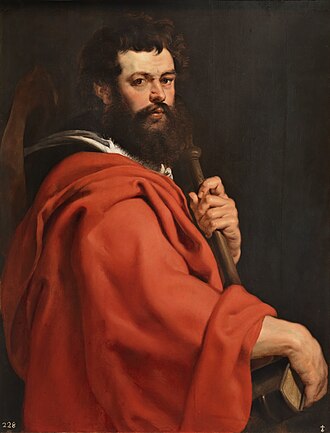BENEDICT XVI
GENERAL AUDIENCE
Wednesday, 21 June 2006
James, the Greater
Dear Brothers and Sisters,
We are continuing the series of portraits of the Apostles chosen directly by Jesus during his earthly life. We have spoken of St Peter and of his brother, Andrew. Today we meet the figure of James. The biblical lists of the Twelve mention two people with this name: James, son of Zebedee, and James, son of Alphaeus (cf. Mk 3: 17,18; Mt 10: 2-3), who are commonly distinguished with the nicknames “James the Greater” and “James the Lesser”.
These titles are certainly not intended to measure their holiness, but simply to state the different importance they receive in the writings of the New Testament and, in particular, in the setting of Jesus’ earthly life. Today we will focus our attention on the first of these two figures with the same name.
The name “James” is the translation of Iakobos, the Graecised form of the name of the famous Patriarch, Jacob. The Apostle of this name was the brother of John and in the above-mentioned lists, comes second, immediately after Peter, as occurs in Mark (3: 17); or in the third place, after Peter and Andrew as in the Gospels of Matthew (10: 2) and Luke (6: 14), while in the Acts he comes after Peter and John (1: 13). This James belongs, together with Peter and John, to the group of the three privileged disciples whom Jesus admitted to important moments in his life.
Since it is very hot today, I want to be brief and to mention here only two of these occasions. James was able to take part, together with Peter and John, in Jesus’ Agony in the Garden of Gethsemane and in the event of Jesus’ Transfiguration. Thus, it is a question of situations very different from each other: in one case, James, together with the other two Apostles, experiences the Lord’s glory and sees him talking to Moses and Elijah, he sees the divine splendour shining out in Jesus.
On the other occasion, he finds himself face to face with suffering and humiliation, he sees with his own eyes how the Son of God humbles himself, making himself obedient unto death. The latter experience was certainly an opportunity for him to grow in faith, to adjust the unilateral, triumphalist interpretation of the former experience: he had to discern that the Messiah, whom the Jewish people were awaiting as a victor, was in fact not only surrounded by honour and glory, but also by suffering and weakness. Christ’s glory was fulfilled precisely on the Cross, in his sharing in our sufferings.
This growth in faith was brought to completion by the Holy Spirit at Pentecost, so that James, when the moment of supreme witness came, would not draw back. Early in the first century, in the 40s, King Herod Agrippa, the grandson of Herod the Great, as Luke tells us, “laid violent hands upon some who belonged to the Church. He had James, the brother of John, killed by the sword” (Acts 12: 1-2).
The brevity of the news, devoid of any narrative detail, reveals on the one hand how normal it was for Christians to witness to the Lord with their own lives, and on the other, that James had a position of relevance in the Church of Jerusalem, partly because of the role he played during Jesus’ earthly existence.
(To continue reading, please see here).

